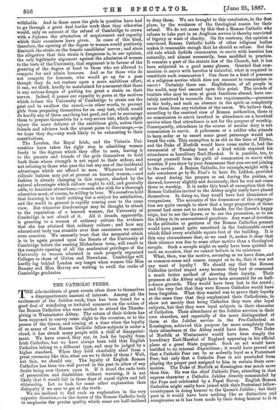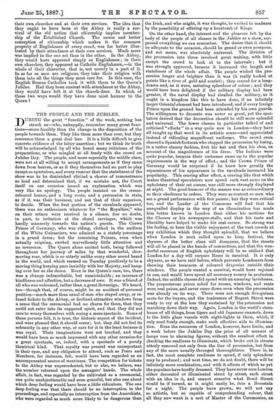THE CATHOLIC PEERS.
THE side-incidents of great events often draw to themselves a disproportionate amount of interest. Among all the excitement of the Jubilee week, time has been found for a good deal of wondering or irritated comment on the action of the Roman Catholics who were invited to attend the Thanks- giving in Westminster Abbey. The return of their tickets has been supposed to convey some Blight to the occasion, or to the person of the Queen, and coming at a time when the loyalty of so many of our Roman Catholic fellow-subjects is under a cloud, it has struck many people with a chill of disappoint- ment. We have ceased, they say, to look for loyalty from Irish Catholics, but we have always been told that English Catholics belong to a different type, and may be judged by a higher standard. When they hold churlishly aloof from a great ceremony like this, what are we to think of them ? Well, not this, we should say. The loyalty of English Roman Catholics has been too well proved in the past to allow of any doubt being now thrown upon it. If it stood the rude tests of persecution and disabilities without wavering, it is not likely that it would fail in these days of equal rights and full citizenship. Let us look for some other explanation than disloyalty if we care to get at the truth.
We are inclined to find such an explanation in the very opposite direction,—in the desire of the Roman Catholic body to emphasise the precise quality which some are half-inclined
to deny them. We are brought to this conclusion, in the first place, by the weakness of the theological reason for their refusal. We do not mean by this that a Roman Catholic who refuses to take part in an Anglican service is thereby convicted of bigotry or want of charity. On the contrary, the opinion a convinced Roman Catholic holds of other religious bodies makes it reasonable enough that he should so refuse. But the old rule which forbids communion ire sacris with heretics has naturally, and almost necessarily, been modified in practice. It remains a part of the statute law of the Church, but it has been subjected to a good many glosses. Granted that com- munion in sacris with heretics is unlawful, what is required to constitute such communion Can there be a kind of presence at a religions service which does not amount to communion in sacris ? Certainly there can. Englishmen, of all people in the world, may feel assured upon this point. The crowds of tourists who may be seen at great functions abroad, have cer- tainly contrived to reconcile the two requirements,—presence in the body, and such an absence in the spirit as completely saves them from any violation of the canon. We believe that, according to the received view of Roman authorities, there is no communion in sacris involved in attendance on a heretical service when that attendance is not for the purpose of worship. Consequently, attendance in the course of secular duty is not communion in sacris. A policeman or a soldier who attends to keep order or to escort some great personage would not break the rule. This exemption is as old as the time of Elisha, and the Duke of Norfolk would have come under it, had the ceremonial of Tuesday been of a kind which required his attendance as hereditary Earl-Marshal. It is possible, too, to exempt yourself from the guilt of communion in sacris with heretics, if you show by your demeanour that you are not joining in the service. A Roman Catholic, for exempla-might with a safe conscience go to St. Paul's to hear Dr. Liddon, provided he stood during the prayers or sat during the psalms, or showed, however slightly and decorously, that he was not come there to worship. It is under this head of exemption that the Roman Catholics invited to the Abbey might easily have placed themselves. In doing so, they would have had abundance of companions. The accounts of the demeanour of the congrega- tion are quite enough to show that a large proportion of those present had come not to return thanks for the Queen's happy reign, but to see the Queen, or to see the procession, or to see the Abbey in its unaccustomed garniture. Any want of devotion in the attitudes or gestures of the Roman Catholics present would have passed quite unnoticed in the fashionable crowd which filled every available square foot of the building. It is this very circumstance that, as we read it, makes it clear that their absence was due to some other motive than a theological scruple. Such a scruple might so easily have been quieted on such an occasion, that we cannot believe in its existence.
What, then, was the motive, assuming as we have done, and as common-sense and reason compel us to do, that it was not any want of loyalty? We should say that the Roman Catholics invited stayed away. because they had at command a much better method of showing their loyalty. Their presence at the Abbey might have been accounted for on half- a-dozen grounds. They would have been lost in the crowd ; and the very fact that they were Roman Catholics would have been forgotten. What they wanted was to prove their loyalty at the same time that they emphasised their Catholicism, to show not merely that being Catholics they were also loyal subjects, but that they were loyal subjects in their character of Catholics. Their attendance at the Jubilee services in their own churches, and especially of the more distinguished of them at the Jubilee service in the Pro-Cathedral at Kensington, achieved this purpose far more completely than their attendance at the Abbey could have done. The Duke of Norfolk at Westminster would have been simply the hereditary Earl-Marshal of England appearing in his official place at a great State pageant. Such an act would have testified to no internal dispositions ; it would have proved not that a Catholic Peer can be as ardently loyal as a Protestant Peer, but only that a Catholic Peer is not precluded from playing the proper part assigned to him in certain State cere- monies. The Duke of Norfolk at Kensington was much more than this. He was the chief Catholic Peer, attending in that express character a Catholic Jubilee directly commanded by the Pope and celebrated by a Papal Envoy. English Roman Catholics might easily have joined with their Protestant fellow- countrymen in doing honour to the Queen's Jubilee ; but their part in it would have been nothing like so distinctive and conspicuous as it has been made by their doing honour to it in their own churches and at their own services. The idea that they ought to have been at the Abbey is really a sur- vival of the old notion that citizenship implies member- ship of the Established Church. The newer and better conception of citizenship which makes it the common property of Englishmen of every creed, was far better illus- trated by their attendance at their own services. Much more was implied in the one act than in the other. In the Abbey, they would have appeared simply as Englishmen ; in their own churches, they appeared as Catholic Englishmen,—in the whole of their character, that is, not merely in a part of it. In so far as men are religious, they take their religion with them into all the things they most care for. In this ease, the English Roman Catholics took it with them to the Queen's Jubilee. Had they been content with attendance at the Abbey, they would have left it at the church-door. In which of these two ways would they have done most honour to the Queen ?



































 Previous page
Previous page